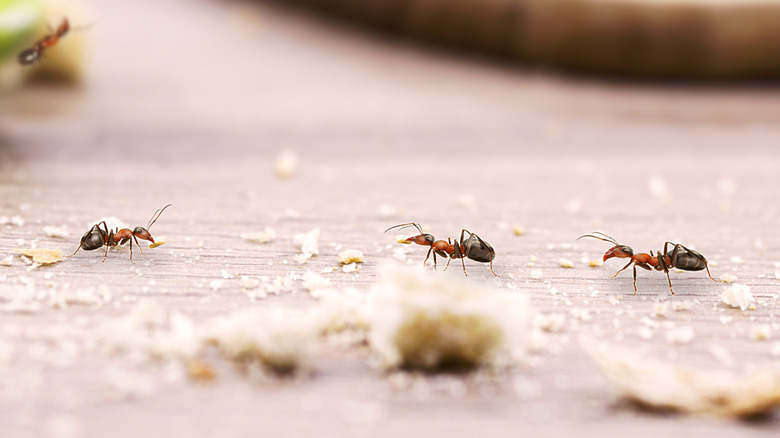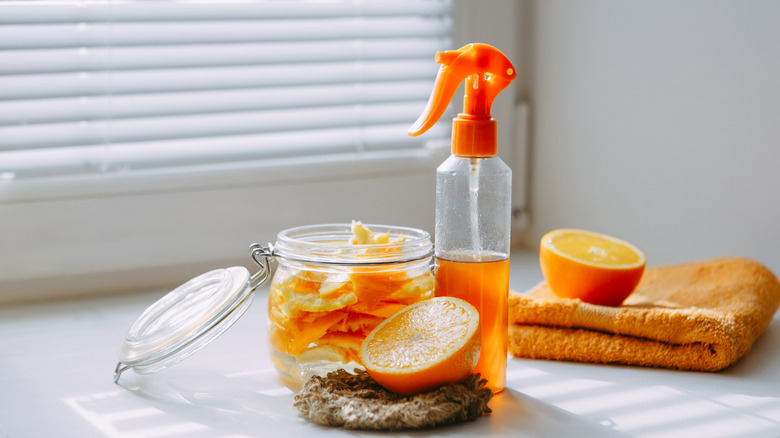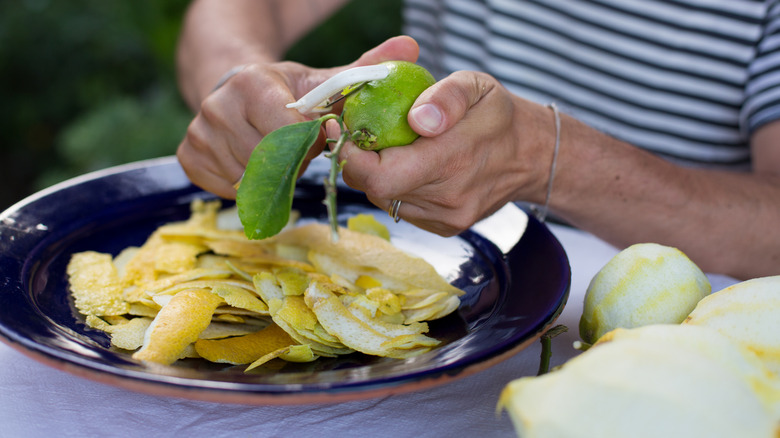An Easy Fruit Trick May Be The Key To Keeping Ants Out Of Your Home For Good
Got an ant infestation? Combating these pests can be tricky, especially in areas like your kitchen, where chemical sprays and traps don't mix with food prep. That's when you need a natural repellent to keep bugs at bay without compromising your health. Luckily, you can make a safe and effective bug spray using orange, grapefruit, or lemon peels right at home.
The skin of various citrus fruits contains an organic compound called D-limonene, which has been shown to kill ants quickly and help prevent them from coming back. The best part is that it's safe to use around food and humans, and it doubles as an effective cleaner. Plus, it smells great! Extracting D-limonene from discarded fruit scraps is a fast, easy, and inexpensive process. The resulting mixture can be bottled and used as a spray on most surfaces. Here's how you can use leftover citrus peels to keep your kitchen pest-free.
D-limonene is safe around humans but toxic to ants
D-limonene is the chemical compound in citrus peels that gives the fruit that smell we know and love. It's also responsible for the tart taste in these fruits, and while it's considered safe for humans, D-limonene can be toxic to insects. When the compound is sprayed on ants, D-limonene coats the bug's exoskeleton, breaking down the waxy coating on its body, which, in turn, suffocates the insect. For this reason, D-limonene is also commonly used in orange-scented flea treatments for pets.
Ants have a strong sense of smell, which they use to find food and navigate their surroundings. D-limonene emits a powerful aroma that can overwhelm an ant's olfactory system. That's why D-limonene also doubles as an effective ant-repellent. The insects will avoid the smell because it hinders their ability to locate food and find their way home.
Not only does this compound smell great to humans, but D-limonene also works as a natural solvent, cleaning grease off kitchen cabinets and easily breaking down other types of grimy build-up. That means it can pull double duty on your kitchen surfaces, cleaning them while leaving behind a scent that repels bugs. Finally, the Food and Drug Administration has labeled this compound as GRAS, or Generally Recognized As Safe, and it's non-carcinogenic. Unlike other types of bug sprays, D-limonene sprays don't pose risks to humans. D-limonene has been shown to harm cats in certain quantities, so keep your pets away from the spray when in use.
Make your own bug spray with discarded citrus peels
Making your own natural bug spray takes minutes and is basically free. Hang onto those rinds next time you squeeze a lemon or peel an orange to reuse them. Add these pieces into a saucepan and fill it with enough white vinegar to cover the fruit. Then, cook the solution on medium heat without boiling it. Once the peels have lost their color and cooked down, cool and strain the mixture into a spray bottle. You can mist the mixture directly on ants to quickly kill them or use the spray as a cleaner on countertops and other surfaces as a way to prevent the bugs from coming back for a time.
Cooking the peels won't fully extract D-limonene the way true distillation methods can. Still, to avoid buying a kit and getting into the nitty gritty, it's the best at-home method. For the real deal, you can purchase D-limonene extracts in liquid form, which you can use to mix up your own sprays. Search for cleaners and ant repellents that contain D-limonene for a ready-made option.


